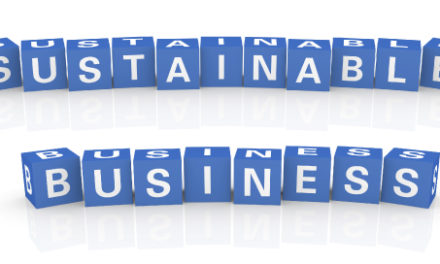1. Look beyond the environmental issues
“If we want to do business we must be involved in all aspects of sustainability. The large manufacturers in our industry in North America are very well engaged with sustainability and there is pressure from the market to be more active. There is pressure from our customers, driven by the architects and designers who influence the decisions our customers make,” – Jean Barbeau, a product specialist who is responsible for the company’s sustainability initiative at Artopex. SMEs should always aware about all sustainability issues around them to understand the risks and opportunities that are available for their organizations. Furthermore, SMEs should engage with outside expertise to seek more opportunities on every aspect of sustainability instead of just environmental issues. Besides, SMEs should be as innovative as possible to find solutions for the targeted issues to reduce emissions and increase efficiency.

SMEs have to know the means of ‘sustainability’ to their organizations because every company define it in a different way. – atsiteinc.com pix
2. Define ‘sustainability’ means to your organization
SMEs have to set a clear definition of sustainability means to the organization and focus on the right goals. Measuring sustainability is essential as it acts as a report to know how much efforts and how long an organization takes to accomplish the goals. SMEs should embrace industry-wide initiatives and engage with peer organisations to achieve sustainable goals. Aside from that, SMEs should also share best practices with organisations that face the same challenges in regard to sustainability. Always remember that improving sustainability is an ongoing process, not a one-off effort.
3. Engage with all stakeholders
Bear in mind that engagement of employees starts with the commitment of senior management. SMEs should engage with all stakeholders including employees, investors, customers and suppliers and hear their point of views about the sustainability. Their opinions and suggestions are helpful for the organization to develop a better strategy to improve the organization profitability. Listening to their ideas also helps to generate greater loyalty and commitment from all stakeholders. At the same time, SMEs should keep a long-term perspective on the balance between sustainability and profitability. It is a good opportunity for SMEs to involve in local community activities such as charitable events which reflect the organization in being a good corporate citizen. Moreover, such activities also improve the status of an organization in the community. In other words, SMEs have to believe that sustainable business practices will bring benefits to the company. Sustainability is not just about providing benefits to an organization but is about doing the right thing at the right time. “We have a lot of environmental efforts, such as recycling, improving our packaging and minimising our energy usage, but sustainability is much broader than that. For us, it is a holistic approach,” says George Mandragouras, an experienced public accountant who is CFO of Cirtronics.
4. Engage with other organizations
Always remember, no organization can stand-alone. SMEs should always look for collaboration opportunities with other organizations in sustainability which help to gain greater finance support as well as to gain greater public exposure. Besides, SMEs should invest time at management level on building a sustainable strategy that has a long-term perspective. ”We realised that a sustainability strategy could make us very different to our competitors, save us money and give our customers good reasons to buy from us,” says Jerry Young, ACMA, Finance Director of stationery and office equipment supplier UKOS plc.

Get involved in community or industry initiatives to kickstart a sustainability drive. – info.communispond.com pix
5.Establish responsibility and communicate widely
”Sustainability is not something that is laid on top of the business. It does not have to be a separate issue. It is just part of being a good business.” – Peter Hart, Billington Structures Finance Director. Sustainability is a core element for being a good business. Therefore, it is important that the senior management knows well about the policy, able to appoint sustainability champions and communicates the importance of sustainability to all levels of the company. Everyone has their own responsibility within an organization and they should have their own responsibility for the sustainability too. SMEs should as well consider sustainability across their network of suppliers instead of focusing within their own company. They should communicate widely with other organizations or industry associations and view sustainability in a wider context.
6. Walk the talk
SMEs should back up the company’s intent with meaningful actions. Customers and investors are wise to greenwashing, so SMEs shall not view sustainability as a marketing venture. SMEs should engage with the sustainability agenda and financial services is no exception. SMEs should have seized the opportunity to position themselves as ‘green’, focusing particularly on the environmental aspects of sustainability. For instance, paperless accounts that are run entirely online.

Making small changes can lead to significant effects in the future. – strategicvisionlimited.com pix
7. Step by step practices
Planning is typically important in sustainability. Every small step makes a big difference. Every single step need to be plan wisely and each step takes some times to achieved. A move toward sustainability is an evolution. SMEs need to set realistic goals to improve sustainability in key areas of a business and apply them in a practical way based on the latest sustainable issues. SMEs should identify and build on the elements of the organisation’s existing business model that promote sustainable activities and practices. Furthermore, SMEs should make clear on links between sustainability and efficiency, and between efficiency and cost savings. Always have environmental experts in the design of new projects so that they are able to enhance the result of any of the sustainability project by giving guidance or advices.

Everything you use or create in your business, even waste, might be turned into a value-added product. -footyprofit.co pix
8.Tie sustainability to profit
Becoming more sustainable often means being more efficient. It is important that an organization knows about their unique selling points among others competitors in order to improve sustainable business practices in a more efficient and effective way. An organization should always seek for opportunities to network with local organizations that share sustainable goals to pool knowledge and co-ordinate effort. SMEs should always believe that small businesses have the power to set the agenda for sustainability and change the behaviour of large corporations and whole industries.
9. Measure, monitor and review
It is important for SMEs to develop clear metrics to track your progress and review them regularly and continue to set reachable goals. Tracking progress is essential because it establishes the value of sustainability initiatives. ”Sustainable development must be seen not as an expense but as an investment. In drafting the sustainable development policy, finance is involved throughout. As with all entities in the organisation, finance must be involved directly in the sustainable development approach,” says Philippe Rainville CPA, CA, VP of Finance and Administration at ADM.
10. Invest in the future
Sustainability initiatives don’t always require large capital investments. Many SMEs in the report said the biggest investment was management’s time. SMEs should engage with outside expertise to ensure that the company considers every aspect of sustainability, not just environmental issues. SMEs should be willing to share information with stakeholders to come up with innovative solutions to reduce emissions and increase efficiency. In addition, SMEs should as well build on the activities which the company has already involved in order to have more traction in the arena of sustainability. Further, SMEs must invest time , capital in technology and processes which deliver both commercial benefits and sustainability gains.
Source: CMGA Tools Ten Key Elements to Sustainable Business Practices in SMEs
Related: Trust, not green marketing, is the key to driving sustainable consumption, 9 reasons you should convert to online business, 5 tips to make online selling easy & efficient















